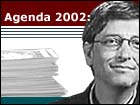
NEW YORK (CNN/Money) -
Where does all this investment activity put us on the cash trail? Not very far along. Because with all the new ventures, long-term investments and acquisitions, even with one of the largest R&D budgets on the planet, Microsoft's cash stake continues to grow.
Despite what the executives say, they don't really need the $40 billion stake to fund new projects. With $1 billion a month in new cash rolling in, they can pay for R&D out of operating proceeds. So the question returns, more pressing this time: What is the $40 billion stash really for?
Back in Connors' office, the chief financial officer is becoming mildly agitated. Why can't everybody see, Connors seems to implore, that $40 billion isn't that much for a company with Microsoft's scale and ambition? It might not be enough, in fact, to meet whatever awesome yet unnamed challenge could be lurking around the next corner.
"We always try to remind people that there are a lot of risks that we face, a lot of uncertainty," Connors explains. "And we think the game is just beginning, not ending. If you look out 10 years or more, which is how we are looking at the company right now... there is an essential security and flexibility that the cash balance provides."
So along with helping deliver a buffer of consistent earnings, via investment income, and funding new initiatives, Microsoft's cash cache is also, it turns out, an insurance policy. Insurance against what? Consider, for instance, the myriad lawsuits still pending against the company. If the European Commission finds that Microsoft violated antitrust rules, it could fine the company 10 percent of annual revenue.
| |
 More on Microsoft
More on Microsoft
| |
| | |
| | |
|
The latest round of antitrust challenges in the U.S. from the attorneys general of nine states and other pending suits might also have significant financial repercussions. But its cash position means that Microsoft could probably handle even the worst-case monetary-damage scenarios of these suits. That helps insulate the company's stock from investors' anxiety about legal liability.
Then there is the company's not insignificant stock options overhang. Since Microsoft compensates employees so aggressively with options, the company carries a tremendous (if largely hypothetical) options obligation at all times.
At the end of June 2001, employees had 331 million shares of exercisable options with a market value of $24 billion. Every year the company buys back gobs of stock to combat dilution from the millions of options that are redeemed. In its last fiscal year, Microsoft spent $6.1 billion to repurchase 89 million shares. So here too, Microsoft's cash acts as an insurance policy for investors who might be uneasy about a future liability. If need be, the company has the resources to meet its obligations.
Last stop: market psychology
Despite all these explanations, there are those who see a more nefarious purpose in Microsoft's cash hoard: that it is really a tax shelter designed to keep 12 percent owner Bill Gates from having to pay a huge IRS bill on what could be an enormous dividend.
In an open letter to Gates this past January, Ralph Nader and co-author James Love (the director of Nader's Consumer Project on Technology) charged that Microsoft's refusal to pay a dividend was a tax dodge for large, wealthy shareholders. They even mentioned Gates explicitly as one of the beneficiaries.
Gates has not directly responded to these charges, but one can hardly blame him. For all of Nader and Love's high-minded language, there are plenty of far smaller investors who are no doubt happy to continue deferring any tax bill on Microsoft's cash. That's essentially Connors' response.
"We look at the [dividend] question every year," he says, "and every year, the board has decided that a dividend has not been in the best interests of shareholders. I think there will come a day that paying a dividend is the appropriate thing to do, but I don't know when it will be."
Nevertheless, the dividend issue takes us to the final stop on Microsoft's money trail: market psychology. Companies that pay out dividends have, historically, been those with slower growth and lower P/E multiples. Conversely, those with high-flying growth and premium P/Es rarely pay out dividends.
If Microsoft were to begin disbursing its cash, that might be taken by investors as a signal that its days of heady growth were over. The premium paid for Microsoft's stock would narrow, the P/E would contract and the stock price would fall, offsetting any cash passed on to shareholders by a dividend.
Microsoft, throughout the 1990s, was among the most richly valued stocks around, sometimes sporting a P/E three times the S&P 500's average. Even today -- with growth slowing and margins narrowing -- the stock is still trading at 32 times Wall Street's earnings estimate for fiscal 2002. Eric Upin, an analyst at Robertson Stephens, projects that the company will grow earnings a bare 2.8 percent this year, all from the one-time sale of the Expedia online travel business to USA Networks.
He asks, "Should you pay yesterday's multiple for less earnings growth?" Microsoft's management has a strong incentive to do everything in its power -- including hoarding cash -- to keep the promise of future growth alive.
To read about whether Microsoft is still a sure bet for investors, click here.

|

